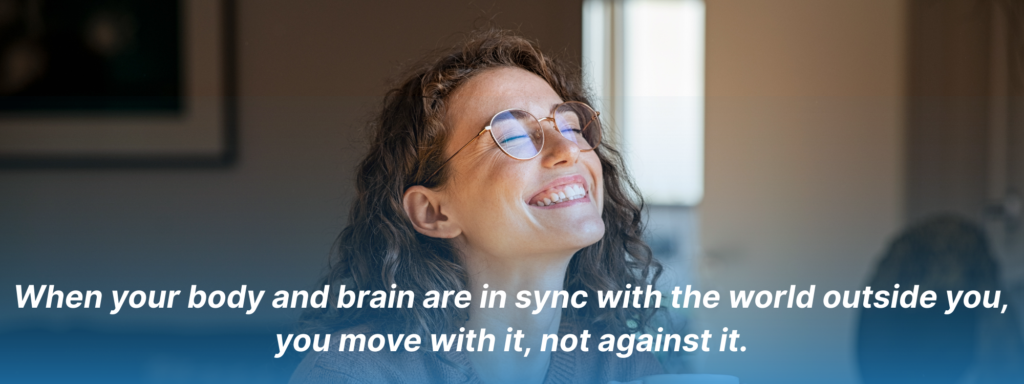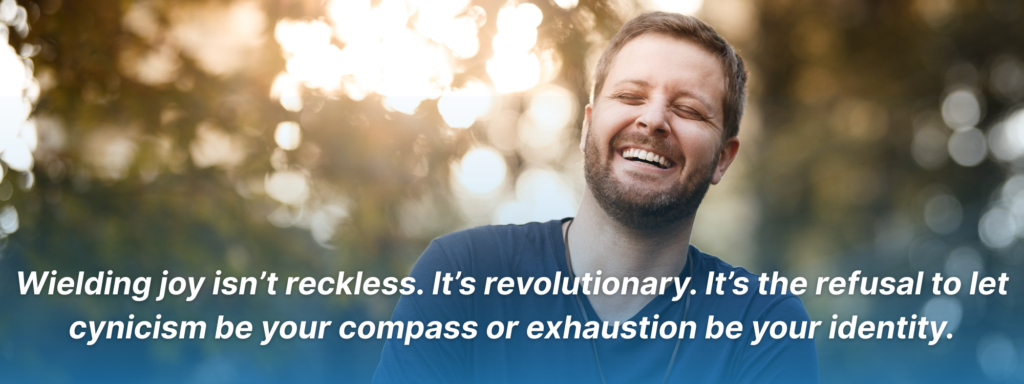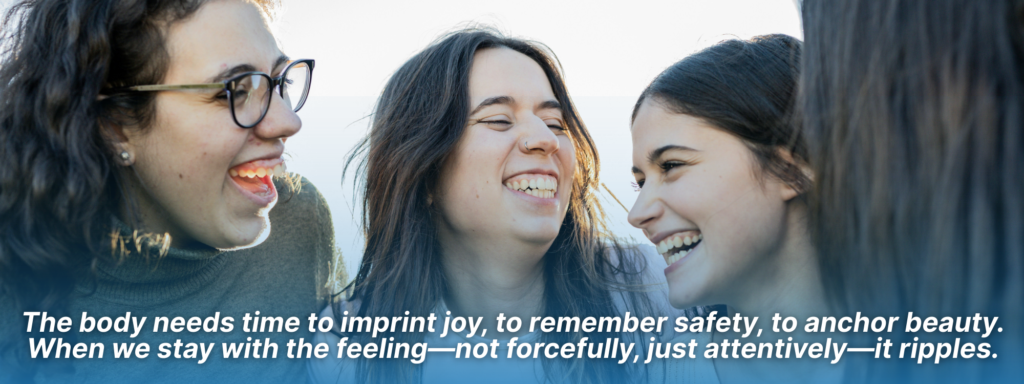You’ve probably stood there too. Not in crisis, not in collapse—just in a kind of quiet absence. A moment between tasks, kettle humming, notifications whispering across a locked screen. And yet, something inside you is unreachable. The body’s here, but nothing in it feels lit. You’re not unwell, not exactly. But you don’t feel alive either.
It’s a strange, modern numbness. The kind that doesn’t scream, only settles. You keep showing up, keep getting through—but slowly, subtly, you start to forget what it feels like to really want to wake up.
We think of joy as something bright and loud. But joy can be soft. It can be the sound of your own breath when no one’s listening. The sensation of ease blooming somewhere in your lower back. The moment you stop clenching without even noticing you’d been holding on.
This is not another promise of a better life if you just try harder. It’s an invitation to return. To feel. To live—not as a project, but as presence. You haven’t lost anything permanent. It’s all still here, under the noise. You just need a way back in. And the way back begins in the body.
First Secret: To Soften Is to Conquer Stress
There’s a moment—just before the outburst, the shutdown, the silent retreat—when the body braces. It tightens around something invisible. The shoulders inch upward. The breath goes shallow. The jaw locks. You might not even notice it, because tension often disguises itself as focus, as determination, even as strength. But the body knows the truth. It is not preparing to flourish—it is preparing to survive.
Softening isn’t weakness. It’s not indulgence or laziness or letting your guard down in a dangerous world. It is the only thing that makes sensing possible. And sensing is the first act of coming back to life.
Begin small. Let your tongue grow heavy on the floor of your mouth. Feel what that does to your breath, to your neck, to the base of your spine. Move your awareness slowly—like light spilling across a room—into the places that feel clenched, armoured, hidden. And when you find them, soften. Again. And again.
Then try smiling—not with your face, but with your body. Let that warmth travel. You do not have to fight to be safe. You do not have to win to belong. Soften, and you will find that safety and strength were never separate. They were waiting for you to come home.
Second Secret: Freedom Is the Balance of Body, Brain & World

There’s a quiet intelligence in your body. It doesn’t come with language or argument. It doesn’t need a mirror or a mantra. It arrives in moisture—the wetness of your mouth, the clarity of your eyes, the warmth in your hands. These are not incidental. They are signals, the body’s native language for telling you whether it feels safe enough to live fully.
When we stop noticing those signals, we drift. We follow the schedule but lose the thread. We eat but don’t taste. We speak but don’t connect. Our thoughts become louder than our senses, and our nervous system—desperate for reference—spins tighter and tighter, unsure if it’s even welcome in the world it’s trying to navigate.
Balance doesn’t mean stillness. It means attunement. When your body and brain are in sync with the world outside you, you move with it, not against it. You meet sound, light, gravity—people—with responsiveness instead of defence. Begin by noticing: how moist is your mouth right now? What’s the quality of your breath? What is your posture trying to say? These are not small details. They are your proof of freedom, pulsing beneath the surface, ready to guide you back into a world that’s still waiting for your full arrival.
Third Secret: Let Go to Either Drift or Flow
Letting go is not the same as giving up. It’s not collapse, and it’s not carelessness. It’s a shift—a movement from controlling the moment to being inside it. You’ve felt it before. That strange sweetness when you stopped trying to say the perfect thing and just spoke. When you danced without choreography. When you touched without plan. That was flow. Not because you forced it, but because you finally stepped aside.
But flow states aren’t what always want to come. Sometimes, you can just let yourself drift. Thoughtless and safe but unanchored and without direction. And that too is part of the living joy. Meditative trance is restful wellbeing. It’s the nervous system realigning, our core-self resetting. It is the quiet before the pulse picks up again.
When flow comes it is not summoned by force. It arrives when the mind is clear and the body focuses on present moment. The practice is simple, but not easy: loosen your grip. Notice when you’re bracing for applause or scripting your next move. Stop. Breathe. Let the rhythm lead, not your inner taskmaster. You may drift. You may flow. Either way, you are moving. You are alive. And that—despite what the world may have taught you—is enough.

Fourth Secret: Learn to Wield Joy—It’s Your Birthright
Joy isn’t loud. It doesn’t need to be. Sometimes it comes in on tiptoe, trailing the scent of oranges or warm rain or freshly laundered sheets. Sometimes it hums in your bones when you remember a joke too late and laugh anyway. Sometimes it’s just the feeling of your feet touching the floor and knowing—without explanation—that you’re glad to be here.
But many people live as if joy must be earned. As if it’s a luxury allowed only after all the duties have been ticked off and all the pain properly processed. That lie keeps us in exile.
Joy is not a bonus. It is biological. It’s the energy that fuels vitality, libido, intimacy, curiosity. It doesn’t ask if you deserve it—it waits for you to notice it. Start small. The first sip of coffee. Bare feet on grass. A song that makes your shoulders sway without permission. These aren’t extras. They’re anchors.
Wielding joy isn’t reckless. It’s revolutionary. It’s the refusal to let cynicism be your compass or exhaustion be your identity. You’re not here to endure life. You’re here to live it. And joy—quiet or roaring—is your signal that you’ve started.
Fifth Secret: All Connection is Physical. All Love is Intimate
You know it before you know it. The tilt of someone’s head, the slack in their shoulders, the rhythm of their breath when they speak. The body recognises presence before the mind catches up. Connection isn’t a thought. It’s a shift in your physiology.
We try to build intimacy through language, through logic, through effort. But real connection begins with signals we don’t even realise we’re sending—tone, gaze, posture, timing. It’s not technique. It’s attunement. Two nervous systems, reading each other in silence, asking: Can I trust you? Will you meet me here?
When you stop trying to manage connection and start sensing it, everything changes. You listen with more than your ears. You respond before you explain. You notice when their breath slows—and yours does too.
Love is not a performance. It’s a pulse. And it begins in the space between bodies. That’s where trust is tested. That’s where safety is felt or lost. And that’s where real intimacy is born—not as fireworks, but as a quiet yes. Every connection, however fleeting, begins in the body. And when the body feels safe, loved isn’t just something you say. It’s something you are doing.
Sixth Secret: Embrace Sameness & Difference to Strengthen Your Bond
It’s easy to believe that love should feel seamless. That if you’re with the right person, you’ll always be in sync—same rhythm, same need, same timing. But intimacy is not a duet sung in unison. It’s jazz. Sometimes wild, sometimes clumsy, sometimes so beautiful it makes you weep.
Arousal, climax, recovery—these unfold differently for different bodies. But the deeper differences aren’t anatomical. They’re emotional. Cultural. Historical. Shaped by memory, meaning, even shame. The mistake isn’t that these differences exist—it’s assuming they shouldn’t.
When we treat difference as misalignment, we tense. We defend, explain, justify. But when we meet difference with curiosity, something shifts. We listen. We adjust. We attune. We start to dance in each other’s timing—not perfectly, but deliberately.
Ask instead of assume. Observe instead of override. What you find may not match your pace, but it may hold more depth than you expected. Sameness gives us comfort. Difference gives us richness. Together, they make a bond that doesn’t just survive change—it grows because of it. Love, in the end, is not about being identical. It’s about learning how to meet—and keep meeting—across the beautiful, complicated terrain of two living worlds.
Seventh Secret: Linger in the Afterglow as a Way of Life
We’ve been taught to move on quickly. To chase the next thing, solve the next problem, tick the next box. Even joy—once felt—is filed away and replaced with what’s urgent. But something sacred happens when we stay.
After connection. After laughter. After love. After music, movement, stillness or sex. There is a moment—not loud, not grand—when the body glows with the echo of what just was. That is afterglow. And most people miss it. We don’t linger because we’re afraid to lose it. But the opposite is true. We lose it because we don’t linger.
The body needs time to imprint joy, to remember safety, to anchor beauty. When we stay with the feeling—not forcefully, just attentively—it ripples. Through the skin, the breath, the cells. It becomes memory. It becomes fuel. It becomes home. Let the moment finish you. Let it stay a little longer than your mind says it should. Let yourself soak in what was good without rushing to justify it.
This isn’t indulgence. It’s integration. And the more you practise it, the more you’ll find yourself returning—again and again—to a life that holds you long after the moment has passed. And this isn’t technique. It’s a remembering. A return to the body—not as burden, but as compass. These seven secrets aren’t ‘steps’ to self-improvement. They’re wisdoms. They are invitations to live differently. To feel more fully. To meet the world not with armour but with awareness.
You may not go with them all at once. That’s not the point—wisdom is a long game. Begin where the door is open to yoy. Breathe. Soften. Savour. Let your joy begin to linger. Let your body speak and glisten. Let your life feel joyful again. Because the truth is simple and always has been this:
‘Your ancestors strived to stay alive; so that, someday, one day, their offspring would love the life they had gifted them’.
Look at yourself, now, realise: it was you they meant to love and enjoy life. All of it.




